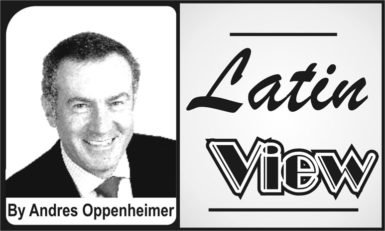 If Ecuador’s opposition candidate Guillermo Lasso wins the April 2 runoff election and becomes his country’s next president, most Ecuadoreans will soon realize that outgoing President Rafael Correa’s alleged “economic miracle” of the past 10 years was a monumental sham.
If Ecuador’s opposition candidate Guillermo Lasso wins the April 2 runoff election and becomes his country’s next president, most Ecuadoreans will soon realize that outgoing President Rafael Correa’s alleged “economic miracle” of the past 10 years was a monumental sham.
In fact, Correa’s government should become a textbook case of economic mismanagement that should be taught in business schools across Latin America. Students should be asked to look at Ecuador’s economic performance and its success in reducing poverty under Correa’s populist “revolution,” and compare it with neighbouring Peru’s.
They would rapidly discover that, while both countries — like much of the rest of South America — in recent years benefited from the biggest boom in commodity prices in recent history, Peru did much better than Ecuador. And it did so quietly, without a demagogue who picks fights with almost everybody and attacks freedom of expression.
While Ecuador’s economy grew by an annual average of 3.4 per cent between the start of Correa’s term in 2007 and 2014, Peru’s economy grew by an annual average of 5.6 per cent, according to United Nations figures.
The gap would be even wider — in Peru’s favour — if the figures included the past two years, during which Ecuador’s economy took a sharp downturn because of the fall in oil prices. The World Bank is projecting that Ecuador’s economy will fall by 2.9 per cent this year, the region’s worst economic performance after Venezuela.
More importantly, Peru did much better than Ecuador in reducing poverty in recent years. While Ecuador has reduced poverty by 30 per cent since 2007, Peru reduced poverty by 69 per cent over the same period, according to UN figures cited by the XPSecurities brokerage firm.
Jose Hidalgo, director of Ecuador’s CORDES economic research firm, says the biggest difference between the two countries is that while Peru has welcomed investments and saved for a rainy day, Correa’s Ecuador went on a populist fiesta that left the country broke.
Under Correa, Ecuador was the South American country that most increased public spending during the oil boom years, Hidalgo says.
Public spending grew from 25 per cent of the gross domestic product to 44 per cent. The number of public employees swelled, and the government went from having 15 cabinet ministers before Correa to 30 ministers currently, he said.
And during that period, Correa hit private businesses with hundreds of regulations and more than 20 tax reforms, sowing growing confusion and scaring away private investments.
During his 10 years in power, the government sector’s participation in overall investments more than doubled from 20 per cent to 52 per cent, the CORDES figures show. Not surprisingly, when oil prices started to fall, investments came to a standstill.
Yes, Correa built roads and schools, but he was more focused on having his picture taken inaugurating public works than in laying the foundations for long-term growth. Peru has also built roads and schools, and — unlike Ecuador — will be able to continue doing so.
Furthermore, while both Ecuador and Peru have been among the countries at the centre of the Odebrecht corruption scandal, one of the biggest known kickback schemes in Latin America’s recent history, there seems to be a big difference in the way both countries are going about it.
Odebrecht’s bribes in Latin America included $34 million to Ecuadorean officials during Correa’s term, and $29 million to Peruvian officials under previous governments, according to US Department of Justice court documents.
Peruvian prosecutors have launched a vigorous probe into the case, ordering the international arrest of former president Alejandro Toledo, who has denied any wrongdoing. Ecuador’s government-pressured courts, on the other hand, have done little or nothing to investigate the case.
Finally, Correa has been one of the top censors of the media in Latin America. Under a Correa-proposed 2013 Communications Law, a newly established media regulating office, SUPERCOM, has issued sanctions in more than 300 cases against media outlets, and several journalists have been forcibly exiled, according to Freedom House and other human rights advocacy groups.
My opinion: Correa squandered Ecuador’s biggest opportunity in recent memory to create long-term prosperity in his country. His narcissist-Leninist pseudo-revolution was much less effective in reducing poverty than neighbouring Peru with its predictable — often boring — market-friendly governments. The comparative facts between these two neighbouring countries should be required reading in all Latin American universities.




